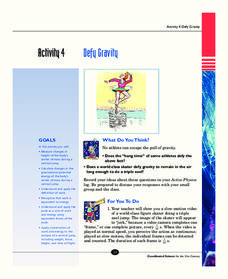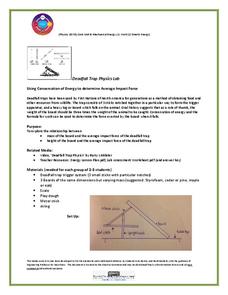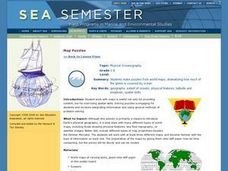It's About Time
The Mu of the Shoe
What is mu? Emerging scientists explore the coefficient of sliding friction, or mu, and apply its concepts as they complete activities in the interesting lesson. They measure the sliding friction between soles of their own athletic shoes...
It's About Time
Circular Motion
Lead your class in this exciting activity to learn more about motion and its importance. Pupils learn about a centripetal and why it is required to maintain a constant speed in a circulating moving mass. They apply the equation for...
It's About Time
Defy Gravity
Test the limits of gravity while encouraging full class participation with this thrilling lesson. Pupils investigate the meaning of work and how it is equivalent to energy. They explore the joule and apply it as a unit of work. They...
University of Saskatchewan
Using Conservation of Energy to Determine Average Impact Force
Explore the center of gravity with your science class as they create a deadfall trap with common materials. They research the concepts of energy conservation and gravitational force before dividing into small groups to create a model of...
Curated OER
Water is Life
Krill is a very small ocean animal that is key to keeping the ocean ecosystem going. The class reviews food webs and chains, learns about the importance of krill, discusses krill anatomy, builds a model of a krill, and then has a...
Nevada Outdoor School
Let It Snow! Let It Melt!
Winter weather offers a great opportunity to teach young scientists about the states of matter. This activity-based lesson includes a range of learning experiences, from experimenting with the rate at which ice melts...
American Chemical Society
Isolation of Phytochrome
Why do soybean plants that are planted weeks apart in the spring mature simultaneously in the fall? Four independent activities cover the history of phytochrome research, scientist collaboration, the electromagnetic spectrum, and...
Columbus City Schools
Photosynthesis and Respiration
Thirty percent of the world's oxygen is produced by rainforests found throughout the world. Seventh grade learners explore the processes of photosynthesis and respiration through 10 days of labs, manipulatives, and discussions. They...
Novelinks
Things Fall Apart: Problematic Situation
If you could pick characteristics you would want your child to possess, what would they be? To better understand Okonkwo, one of the key characters in Things Fall Apart, class groups engage in an activity that asks them to consider this...
University of Wisconsin
What’s a Square Foot Anyway? Laying Out the Design Plan
Clever! Participants don square-foot cardboard shoes to mark out the rain garden plot that they have spent the last few weeks designing. In this way, they are practicing scale modeling as well! Note that this instructional activity is...
Cornell University
Friction
Friction and gravity are always at odds! Learners complete a set of activities to explore the relationship between friction and gravity. Groups make conclusions about the factors that affect the amount and type of friction between surfaces.
Curated OER
Dining Out With Fishes and Birds of the Hudson
The class will make observations to determine how environment has shaped the way particular birds and fish eat. They will view a series of photographs, read two short articles, and then consider how food availability has determined how...
Baylor College
Heart Rate and Exercise
Teach your exercise enthusiasts to read their pulse rate at the radial artery and multiply by four to calculate beats per minute. Learners perform a variety of activities, recording their heart rates after one minute of each. Though...
Perkins School for the Blind
Modified T-Ball
Baseball can be so entertaining! Here are a few great ideas you can use to get your learners with visual impairments out on the old ball field. A sound-enhanced pitching device or T-ball stand is used to alert players when it's time to...
New Mexico State University
Lab 6: Kepler's Laws
A 15-page package thoroughly teaches your physics or astronomy learners about Kepler's three laws of planetary motion. Each one is stated and explained. Class members answer questions, solve problems, and participate in the classic...
Exploratorium
Marshmallow Puff Tube
Let physical science stars experience Newton's first law of motion by blowing marshmallows out of cardboard tubes! Using different lengths of tubing, they find that more force is needed to overcome increasing friction, and they have a...
Carfleo
Substance Use and Abuse
What is substance abuse? What is the difference between a depressant and a stimulant? Here is a comprehensive unit on drug use, including three lessons with such activities as categorizing and defining key terms, identifying...
It's About Time
Detect and Induce Currents
Young scientists recreate an 1820 experiment and build off of it to investigate how to detect and induce electrical currents. As a final activity, scholars answer questions in multiple formats.
Cornell University
Alka-Seltzer Rockets
Blast off! An engaging hands-on activity has pupils create rockets powered by Alka-Seltzer. They learn about the physics behind these rockets throughout the process.
BioEd Online
Good Stress for Your Body
Stress the importance of the different types of pressure our mind and body experience in a instructional activity about how certain types of stress are actually necessary and good for our bodies. As astronauts and people with injuries...
NOAA
Marine Ecosystems
Be at the top of the food chain when it comes to understanding marine ecosystems. The 21st installment of a 23-part NOAA Enrichment in Marine sciences and Oceanography (NEMO) program investigates marine ecosystems, ocean zones, and food...
Curated OER
Map Puzzles
Students make puzzles from world maps, dramatizing how much of the globe is covered by ocean.
Science Friday
Microorganisms on the Move
You can't b. cereus until you see this lesson plan! Young microbiologists learn to prepare deep well slides, observe two types of microorganisms, and compare and contrast their physical characteristics in this interactive and lively...
Kenmore Town of Tonawanda UFSD
Fitness Lesson Worksheet
The best way to really learn something is to teach it! Using this worksheet as their guide, your class members will each create a 20-minute fitness lesson to teach to their peers. Lesson plan template calls for identification of the...

























